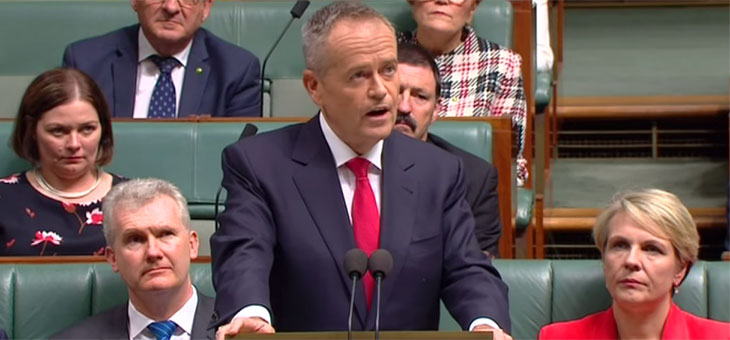Opposition Leader Bill Shorten last night declared war on cancer.
In his budget reply in Canberra, days before a federal election is expected to be called, he outlined Labor plans – if elected – for the National Disability Insurance Scheme (NDIS), tax cuts, education, apprenticeships, renewable energy, infrastructure works, recycling programs, affordable housing, a living wage and fairer pay for women. But he saved his biggest announcement for last – a $2.3 billion cancer care package, which he described as the most significant reform to Medicare since it was created by Bob Hawke in 1984.
He said bulk billing would be expanded to provide 6 million free scans and up to 3 million free consultations with oncologists and surgeons, which currently cost patients 40 per cent of the fee. Medicine for cancer patients would be cheaper through an expansion of the Pharmaceutical Benefits Scheme (PBS) and a “guarantee” that every cancer medicine recommended by experts would be subsidised.
In addition, every MRI diagnostic machine would be eligible for Medicare rebates with Medicare items created for X-rays, ultrasounds, mammograms, CT scans and PET scans.
Mr Shorten described cancer as is the “greatest disease burden in Australia, carrying the greatest out-of-pocket costs in our healthcare system”.
He said nearly half of the 145,000 people diagnosed with cancer every year were more than $5000 out of pocket as a result of their diagnosis and treatment and more than a quarter were at least $10,000 out of pocket.
“Labor believes it should be your Medicare card, not your credit card, which guarantees access to quality healthcare in Australia,” he said.
“For so many people, cancer makes you sick and then paying for the treatment makes you poor.”
Mr Shorten also said Labor would continue to support scientists in their work and invest in cancer research and clinical trials.
Healthcare is a key concern among older Australians, with 44 per cent of respondents to YourLifeChoices’ 2019 Insights Survey saying their retirement was most influenced by health concerns. In the 2018 Retirement Matters Survey, healthcare was rated as the second biggest drain on savings (after energy costs).
Mr Shorten promised to match the Coalition’s personal tax cuts for low and middle-income earners if elected next month but opposed the second and third stages announced by Treasurer Josh Frydenberg on Tuesday. The tax offset is worth up to $1080 for 10 million workers from 1 July. He promised greater tax relief than the Coalition for 3.6 million workers earning up to $48,000.
Mr Shorten opened his speech by referring to a $1.6 billion government underspend on the NDIS despite forecasting a $7.1 million surplus in the 2019-20 financial year.
“We will lift the NDIA (National Disability Insurance Agency) cap on staff numbers, so we can get the support out the door,” he said.
“We will put people with disability back at the centre of decision-making. And we will get the NDIS back on track.”
Is healthcare your biggest concern? Does the Opposition’s cancer package resonate with you?
Related articles:
Backing up claims to fix banking
More funds for at-home aged care
Medicare to benefit

